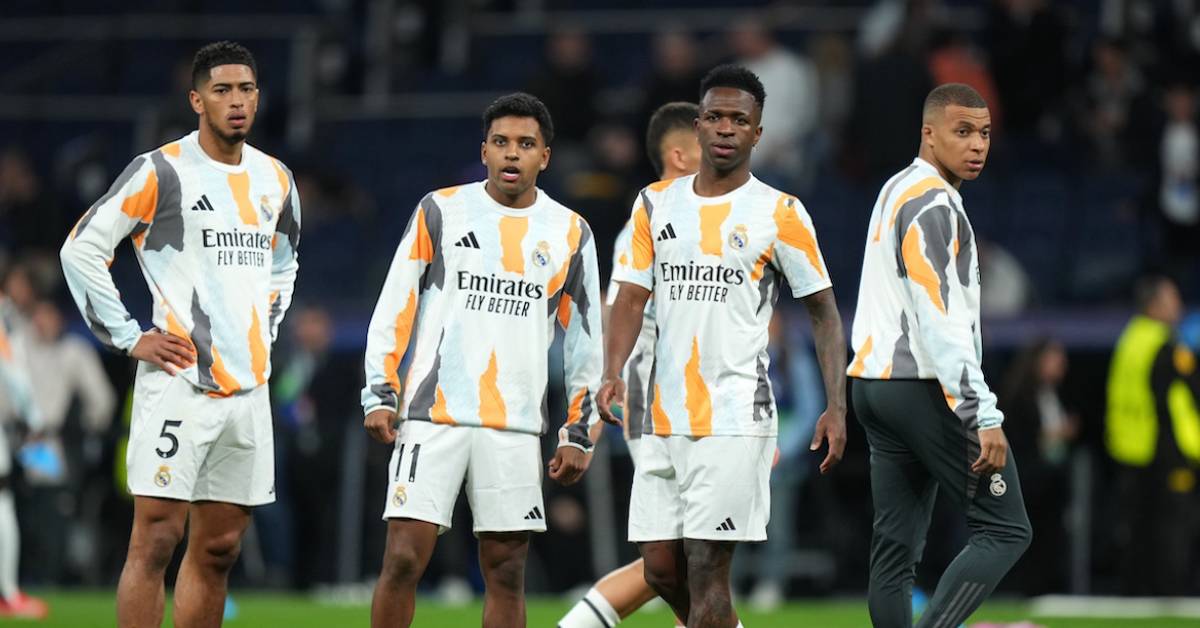Real Madrid will face Arsenal in the quarter-finals of the Champions League. This double-header promises to be a difficult matchup given the Gunners’ solid season.
The Merengues will travel to the Emirates Stadium on Tuesday, April 8th, before hosting the English side on Wednesday, April 16th at the Santiago Bernabéu. Beware those who already expect Real Madrid to qualify for the semi-finals and face Aston Villa or Paris Saint-Germain. Indeed, the current runner-up to Liverpool in the Premier League is a dangerous team for the Whites in many ways.
The Gunners’ Intensity and Pressing
Mikel Arteta’s players are capable of both controlling possession while applying high pressure when the ball is lost in order to win it back as quickly as possible, a bit like Pep Guardiola’s Barça at the time, all things considered, of course. The Gunners’ counter-pressing is formidable and allows the English to gradually suffocate their opponents, preventing them from leaving their own half of the field.
The Londoners will undoubtedly push Madrid to their limits, particularly by disrupting Real Madrid’s opening moves as much as possible. To get around this problem, Carlo Ancelotti’s players could opt for the strategy of sending long balls behind the Arsenal defense, but the physical abilities and reading of the game, particularly Saliba and Gabriel, will make the task difficult.
Arsenal, kings of set pieces
The Gunners excel at set pieces. They’ve scored 64 goals from this area since specialist Nicolas Jover arrived in 2011. This season, the English side have already scored 12 goals from this crucial phase of play at the highest level. Their tactical plan for corners is perfectly executed: William Saliba creates screens in front of the goalkeeper to prevent him from intervening, which opens the door, for example, to the great Gabriel.
Furthermore, set pieces are extremely well taken by Saka and Rice, and there’s no shortage of big men in the box (Saliba, Gabriel, Merino, Havertz, etc.). Meanwhile, Real Madrid have often struggled when they’re awarded corners this season due to marking errors or a lack of defensive aggression. Arsenal will therefore likely find themselves hitting where it hurts.
An Iron Defense
This season, Arsenal’s defense is nothing short of solid and full of confidence. Saliba, Gabriel, Timber, Lewis-Skelly, and Calafiori are players with high-level athleticism and excellent depth control. Moreover, they are also very difficult to eliminate in one-on-one duels. It’s no coincidence that Arsenal has the best defense in the Premier League this season, with only 24 goals conceded in 29 games.
Furthermore, the Gunners have conceded only six goals in 10 Champions League matches, while Real Madrid have conceded 17 goals in 12 games in the same competition. Madrid’s fantastic front four, along with the Madrid defense with Thibaut Courtois as their savior, will have a lot of work to do if they hope to reach the Champions League semi-finals.
Bukayo Saka’s Grand Return
After suffering a serious hamstring injury in December 2024, Arsenal’s top attacking player is expected to return in late March and potentially be ready for the first leg on April 8th. The 23-year-old English winger had an extraordinary 2023-24 season, scoring 20 goals and providing 14 assists in 46 starts. In 2024-25, before his injury, he had already registered 9 goals and 13 assists in 22 starts. If the England international plays against Real Madrid, he will face either Ferland Mendy or Fran García on the left side of the Madrid defense. A duel that, on paper, could work in the Londoner’s favor.
Collective strength and balanced play
This is perhaps what Real Madrid lacks most this season: a well-established game plan and stability in their overall team organization. Indeed, the Gunners excel in their build-up play and their ability to break through defensive lines through a variety of ball channels. Mikel Arteta has instilled a system based on repeated passing and repeated movements to destabilize the opponent. The English team likes to have the ball in their possession in order to control the tempo of the match as they see fit.
Thanks to the technical quality of Martin Ødegaard and the physical impact of Declan Rice and Thomas Partey, Arsenal is able to force their opponents to run in the air before taking advantage of spaces left by fatigue accumulated during the match. Unlike Real Madrid, the English team doesn’t systematically find itself cut in two because it has a system where balance is the absolute priority. It will therefore also be a big challenge for Carlo Ancelotti, who is expected to deliver.

Leave a Reply